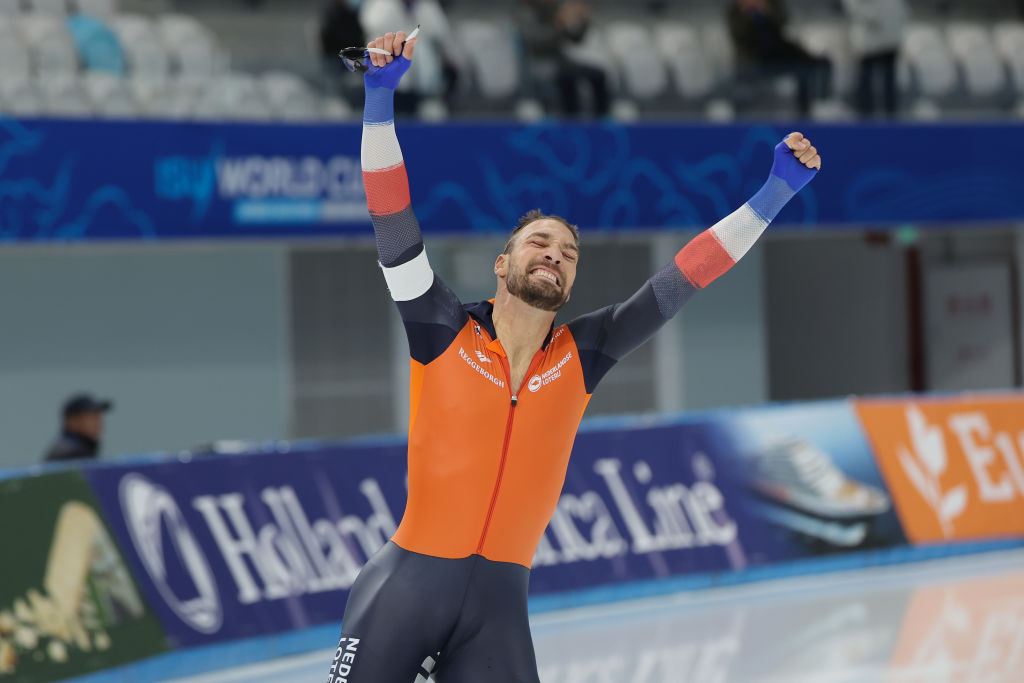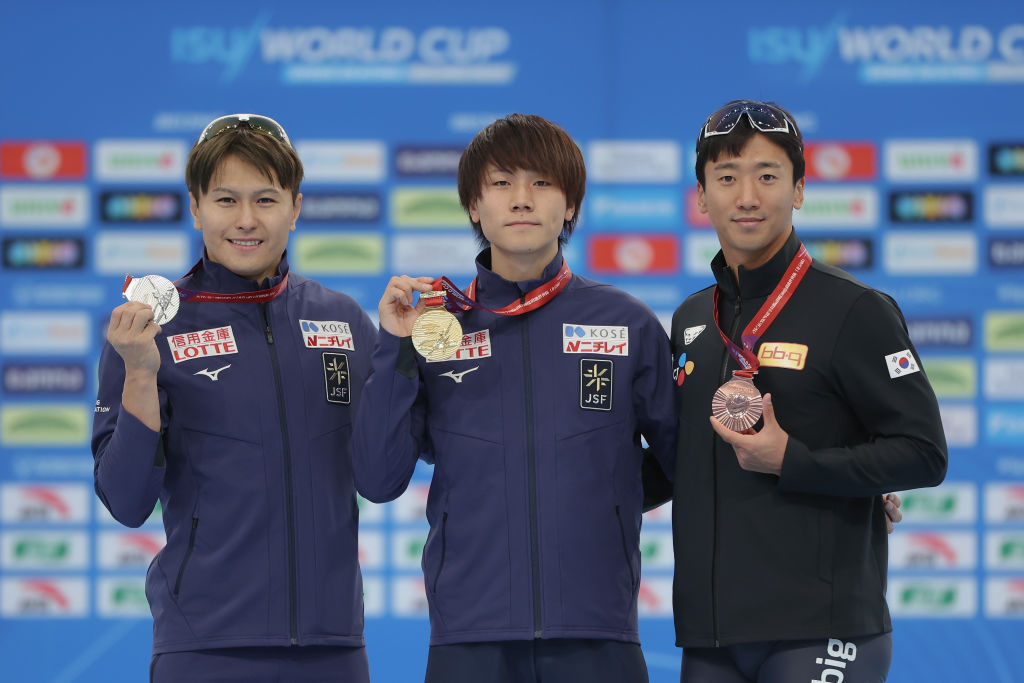Kjeld Nuis (NED) got back in his Beijing bubble to top the 1500m podium at the second ISU World Cup of the season. In an exciting race against home skater Ning Zhongyan (CHN), the double Olympic champion won in 1:44.80, with Ning taking bronze. Wataru Morishige (JPN) won the 500m to take the sole lead in the World Cup rankings, while Olympic champion Gao Tingyu (CHN) returned to the ice with a fast time in the B Division.
“I felt it coming yesterday,” Nuis said after his golden race against Ning. “I had big mouth yesterday and this morning. I already said I was going to win and that’s something I don’t do too often, but it just felt so good.”
Last week in Obihiro, Nuis just missed the podium by a 0.19s margin, coming in sixth. “That was a race I definitely was not happy about. I thought: next week we’ll do it differently.
“I had a great match-up versus Ning. I knew he was eager to give me a hard time and he did just that in a phenomenal way. He opened in 23.3s, that’s really fast. I have to be at my best to open like that. But after the opener, I could keep up with him. It hurts, but being able to glide past him at 700m, felt really good. That’s one more outer corner and then you can chase.”

That winning feeling: Kjeld Nuis (NED) takes 1500m gold after talking up his chances © ISU
After trailing Ning by 0.17s last week, Nuis beat him by 0.71s this time. “I don’t want to call it the Olympic vibe, because that’s when you’re at your utmost best in February and I’m not at that level now, but I felt that I hit every stroke well. I’m the only one who skates so much faster than last week here. Miho Takagi (JPN), who also wins [the women’s 1500m] is one second slower than last week. I’m a second faster.
In fact, Patrick Roest (NED) was almost a second faster too, taking the silver medal just 0.15 seconds ahead of Ning. With 27.3s, Roest posted the fastest final lap by far.
“It was much better than last week,” Roest said. “My opener and my first full lap were still not top-level, but the final lap was very good. I was lucky to skate against Hallgeir Engebråten (NOR). I could chase him down in the final lap.” The 23-year-old Norwegian was still ahead of Roest at the 1100m split, but eventually finished sixth in 1:46.12.
With a good 1500m under his belt, Roest can now but focus on the 5000m on Saturday – and perhaps Nils van der Poel (SWE)’s track record at the Ice Ribbon, set during the Olympic Games. “I don’t look the times we set back then. I focus on my main opponents Davide Ghiotto (ITA) and Sander Eitrem (NOR). Bit it’s great to skate here again. It’s the most beautiful ice stadium in the world.”
Ning Zhongyan might agree. With two bronze medals this season, he climbed to second place in the 1500m rankings behind Nuis, surpassing last week’s winner Masaya Yamada (JPN), who had to settle for 19th place in Beijing
“He’s such a good athlete,” Ning said of Olympic champion Nuis. “Being in the same pair I tried everything, but I was just a little bit too slow. I hope to make amends in the 1000m on Sunday.”
Morishige leads Japanese dominance but Gao is back
Waturu Morishige shook off compatriot Tatsuya Shinhama to top of the 500m World Cup rankings. The two Japanese skaters shared the lead after the first two races in Obihiro, but Shinhama struggled to stay on his feet in the last inner corner at the fast Beijing ice, lost a lot of speed and finished eighth in 35.20s.

Wataru Morishige (JPN, centre) continues his flying start to the season with 500m victory © ISU
Morishige kept his cool, stopping the clock in 34.72s to take his second gold medal of the World Cup season. The 23-year-old from Obihiro was one of only two skaters to set a faster time than Gao Tingyu (CHN) had done in the B race earlier on Friday. The Olympic champion, who had not skated competitively for 21 months, clocked 34.87s, thus earning promotion to the A Division race on Saturday.
Yuma Murakami (JPN) took silver in 34.82s, and Kim Jun-Ho (KOR) bronze in 35.00s, edging out Dutchman Merijn Scheperkamp (NED) by two thousandths of a second.
With seven out of nine available medals in three 500m races, Japan dominate the men’s shortest distance. “In Japan we have at least ten men who can skate a 500m in a low 35s time,” Murakami explained. “It’s very competitive and therefore we all make each other stronger.”
For all information about the ISU World Cup Speed Skating Series, please visit the webpage here.
All Media Accreditations details and deadlines for the ISU World Cup Short Track Speed Skating Series can be found here.
Where to watch
Viewers will be able to watch the World Cup sessions via their national broadcaster/channel.
For countries where there are no broadcasters, the ISU will offer a live stream with English commentary on the Skating ISU YouTube Channel. You will find the full list on the Where to watch webpage here.
Subscribe to the ISU YouTube Channel to receive all the latest videos and follow the conversation with #SpeedSkating.
ISU World Cup Short Track Speed Skating Series events 2023/24:
Nov 10 - 12, 2023 Obihiro /JPN
Nov 17 - 19, 2023 Beijing /CHN
Dec 01 - 03, 2023 Stavanger /NOR
Dec 08 - 10, 2023 Tomaszów Mazowiecki /POL
Jan 26 - 28, 2024 Salt Lake City /USA
Feb 02 - 04, 2024 Québec /CAN
About ISU World Cup Speed Skating Series
The ISU World Cup Speed Skating is a Series of Speed Skating competitions which have taken place annually since 1984. The series comprises six events (four during an Olympic season), with A Division and B Division races. Skaters can earn points at each competition, and the Skater with the most points on a given distance at the end of the series is the World Cup winner in that distance. The four World Cup Competitions held from November to December serve as qualifying events for entry quotas at the ISU European Championships, and the ISU Four Continents Championships. The whole series of six events serves as qualifying events for the World Single Distances Championships, and/or the World Sprint and Allround Speed Skating Championships.
World Cup titles are awarded in 500m, 1000m, 1500m, combined 5000m/10,000m, and Mass Start for men, and 500m, 1000m, 1500m, the combined 3000m/5000m, and Mass Start for women. Both genders also compete for the World Cup titles in Team Pursuit and Team Sprint. New in the 2023/24 program is the Mixed Gender Relay over six laps, in which teams of one man and one woman compete.
(For full explanation of this season’s ISU World Cup (entry rules, formats, qualifying, and prizes: https://www.isu.org/speed-skating/rules/ssk-communications/31562-isu-communication-2587/file)

